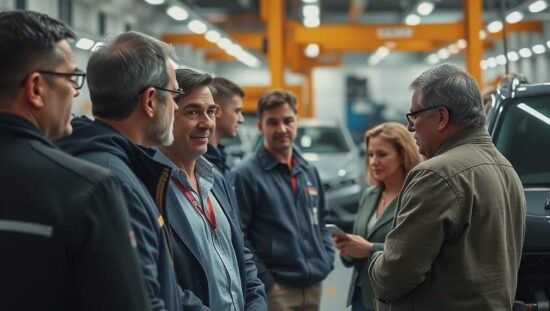The German government is facing mounting pressure to reconsider the European Union’s planned phase-out of combustion engine vehicles by 2035, a move spearheaded by Chancellor Friedrich Merz. Following a high-profile “Automobile Dialogue” at the Chancellery, Merz signaled a willingness to advocate for an easing of the strict deadline, arguing that a sudden cessation would be impractical and detrimental to the German automotive industry.
Currently, EU regulations mandate a gradual reduction in permissible CO2 emissions from new vehicles, culminating in a zero-emission target by 2035. Merz, citing concerns raised by major automobile manufacturers-who suggest a maximum 50% market penetration for electric vehicles by that year-is pushing for greater flexibility. He emphasized the need to encourage continued research and development across a spectrum of powertrain technologies, including those utilizing synthetic or biogenic fuels to achieve climate neutrality for existing combustion engine vehicles.
The move represents a potential fracture within the governing coalition. While Finance Minister Lars Klingbeil (SPD) reaffirmed the government’s commitment to the transition to electric mobility and the overarching climate goals, he indicated openness to softening Germany’s position in Brussels, particularly regarding plug-in hybrids and range extenders. He underscored the importance of securing German expertise and investing in future battery technologies.
The VDA (Verband der Automobilindustrie – German Association of the Automotive Industry), represented by President Hildegard Müller, welcomed the government’s acknowledgement of the need for adjustments to the CO2 fleet regulations, highlighting the need for solutions originating from Brussels to address the complexity of the challenge.
The debate also carries significant implications for the German workforce. Christiane Benner, Chairwoman of IG Metall, the powerful metalworkers’ union, praised the dialogue as a step towards advocating for more pragmatic regulations in Brussels and fostering solidarity within Berlin. She warned of continued job losses within the automotive sector and forcefully argued for greater support for electric mobility – specifically citing the need for expanded charging infrastructure, affordable electricity prices, purchase incentives and overall affordability to secure the future of automotive jobs.
The Chancellor’s shift represents a delicate balancing act: maintaining momentum towards electric vehicle adoption while mitigating the potential for economic disruption and safeguarding German industrial competitiveness. The coming weeks will likely see intensified negotiations within the EU as Germany seeks to reshape the path toward a zero-emission future for automobiles.





